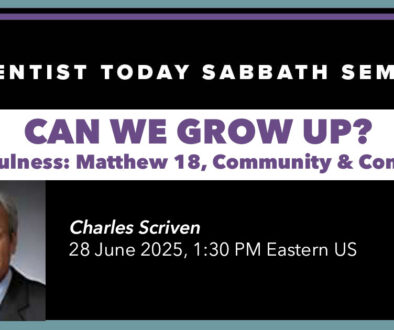Adventism and the Arts: Jim Averitt, Drummer for God
By Debbonnaire Kovacs, March 10, 2015 This is part of a series on Adventism and the Arts. If you know of an Adventist church, group, or individual who use(s) arts in worship or service to God, please email me at artseditor@atoday.org]
When you first walk into the Lexington (Kentucky) Seventh-day Adventist church, nothing strikes you as being particularly out of the ordinary. It’s a nice sanctuary, seating several hundred, with angled pews and good decorating. Piano to the left, organ to the right, pulpit between, so far no surprises. Unless your eyes stray to the right of the organ, to the trio of timpani.
Depending on your expectations, background, and opinions, you may be glad, sorry, or indifferent to the idea of drums in church. It will be when you hear them, adding drama to a hymn, giving depth and richness to a choir anthem or organ piece, making Handel’s Messiah fly even higher than it already does—that’s when you’ll decide what you really think about them.
Jim Averitt, the drummer, says one woman came up to him one of the first times he played and said, “I was disapproving when I saw you roll those things in. I didn’t think they belonged in a church. But then…when you played them during the singing…I love them! Thank you!”
Averitt is an unassuming, friendly-looking man with gray hair, a warm smile, and a large cross on a chain around his neck. He looks as if he could be a pastor from another denomination. He’s not a pastor, but he is from another denomination.
He played timpani in the symphony and various concert bands throughout his school years, but says he didn’t play much during the early years of his working life. “But in about 1978 or so, a friend of mine was organist at the Methodist church. There were about 15-18 people in the choir. The organist wanted to do a fanfare, and he wanted a timpani roll,” Averitt says. They borrowed timpani from nearby Asbury University and Averitt played. The organist loved it, and so did the congregation, so they began to do it more often. Eventually, Averitt bought his own timpani and has now played for everything from congregational singing to special events for 35 years.
He goes over the music in advance, paying close attention to the melody and finding where it needs emphasis, and even more importantly, to the words. “For example, in ‘Crown Him with Many Crowns,’ a very dramatic piece which is enriched by drums, the third verse is about crowning Jesus ‘the Lord of peace.’ You don’t want any bang-up drums there.” Averitt writes in his parts, but he can improvise sometimes, too. “I think drums, to a large extent, are part of the spiritual experience for many, many peoples around the earth,” he says.
But how did he get into playing at Lexington SDA? It’s a long story, actually, one which will not be told here. Averitt and his wife, Sharon, used to attend a large church of a mainstream denomination which went through a dramatic and painful split, losing several hundred members to several other local churches. There were still 100-150 (of an original 7-800) attending, but they were not happy, says Averitt. He and his wife were among those. Some of them met at a restaurant after church to discuss where else they might meet.
Averitt remembers the defining moment for himself. The members had gone through channels, talked to the bishop, the conference, and the district supervisors, but nothing had healed the breach. One Sunday, while he was at his timpani on the platform, he says he “just gave up. I put my sticks down and left. I hadn’t done that before!
“I should have gone home, but my next conscious thought, I was at traffic light at Lane Allen Road. I don’t even know how I got there. I had this thought, ‘Hey, the Seventh-day Adventists meet here; I think I’ll go see if anyone’s here on a Sunday.’ ”
A couple were there, and Averitt talked to them. They arranged for him to meet then-pastor John Bradshaw, and Averitt told him the story. They explained that they weren’t just a disgruntled group; the president and some faculty from Asbury Seminary were in the group and they were serious about worshiping God in a healthier environment. Could they meet at the Adventist church?
Bradshaw allowed them to meet there one Sunday, then took it to the board and they worked out a lease arrangement. For six years, the Faith Fellowship, as the multi-denominational group named themselves, have been meeting at the Adventist church on Sundays. They have grown, and also increased in denominations represented, including Methodists, Baptists, Disciples of Christ, Quakers, Presbyterians, Catholics, and more.
For many Adventist churches, this is still not that unusual; many buildings house groups who worship on both days of the weekend. But the story takes another interesting turn.
Averitt says, “So I seemed to be the point man in connection with organizing this Faith Fellowship. But I was led there by God. He led me there and led John Bradshaw to consent to help us. I started right from the beginning attending the Adventist church, too, and I fell in love with the people! I disagree with some of the church teachings, but I go to both as much as possible.”
His spiritual life, Averitt says, began early. His father was a Methodist pastor and “I was always in church and Sunday School. I was raised in Bible and Bible ways, although I didn’t always translate it into my home life. I was raised understanding grace; that’s the biggest blessing. So there’s no lightning strike conversion; mine was a gradual conversion over my whole life.” He was baptized as a baby, but after attending the Adventist church, there came a time when he decided he wanted to be baptized as his own choice. So present pastor, Pavel Goia, baptized him as part of an Adventist service. “Now,” says Averitt, “I’m an Adventist member and a Faith Fellowship member, and I worship at both.”
When he was young, Averitt says, if people asked about his religious beliefs, he said he was a Methodist. For the last 30-40 years, he just says, “Christian.”
And this is where he joins issue with the Adventist church.
“In my association with Seventh-day Adventist folks, it made me think more about what it is I really believe. What I list as my faith is Christian. Well, what does it mean to be Christian? It made me study a lot, and it disturbs me to some extent, what I learned that the church teaches that I disagree with. I’m nuts about the people; they’re great friends of mine! But at same time, when you read scripture, it was the people who thought their ‘denominational’ teachings were more important than scripture that crucified Jesus. So I am concerned and do a lot of praying about any of the churches who do not give high priority to the gospels. I think the gospels teach us that it’s not important to follow the customs, or Ten Commandments, or to believe in evolution or not. God created and is still creating, and I don’t think I’m in a position to say,’Llisten, God, this is what I think.” Rituals, keeping the whole law, that doesn’t count. What counts is if you follow Christ’s commandments. Feed the hungry, visit the imprisoned, take care of widows and the needy. That’s Christianity.”
And so he drums. And he smiles. And he prays for us. Keep praying, brother! We need them. And you can never have too many prayers.



